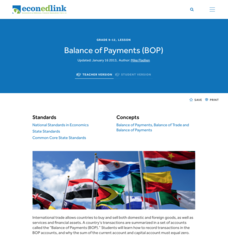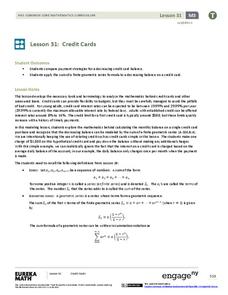Council for Economic Education
Balance of Payments (BOP)
Have you ever checked your clothes to see how many nations created them? Pupils take a deeper look at international trade and the balance of payments nations have with one another. They use calculations, simulations, and primary sources...
CK-12 Foundation
Compound Interest per Period: Credit Card Payment
Credit cards can be convenient, but are they worth it? Future consumers learn about compound interest and credit card payments. They use an interactive to create a table that shows the remaining balance after each month.
Curated OER
Accounting -- Journalizing Sales and Cash Payments
Students brainstorm a list of what they believe a customer is. In groups, they practice journaling sales to a customer who pays with cash or with credit. To end the lesson, they discover the proper way to prove cash payments at the end...
EngageNY
Credit Cards
Teach adolescents to use credit responsibly. The 32nd installment of a 35-part module covers how to calculate credit card payments using a geometric series. It teaches terminology and concepts necessary to understand credit card debt.
Curated OER
How Much Will That House Cost?
What is a mortgage and how do you use it to pay for a house? Young financiers determine how much money is actually spent paying a mortgage payment on a home. They use their math skills to calculate monthly payments on a home given a 30...
Curated OER
Balancing a Budget
Students investigate money management. For this secondary mathematics lesson, students participate in a cost-of-living budget simulation in which they calculate monthly and yearly projected costs. Students investigate housing...
Curated OER
Balancing a Budget
Students calculate living expenses for a non-traditional career choice. They examine interest, balancing a checkbook, and financing cars and homes.
Federal Reserve Bank
Cash the Check and Track the Dough
From checking and savings accounts to learning the importance of maintaining records and balancing a bank account, prepare your students to become financially independent and savvy adults, and explore all the intricacies of owning a bank...
Curated OER
How Credit Card Interest Works
Students experiment with an Excel spreadsheet model that demonstrates the effects of interest on payments. They calculate actual costs, interest paid, and time necessary to pay off credit purchases and draw conclusions about the...
EngageNY
Buying a House
There's no place like home. Future home owners investigate the cost of buying a house in the 33rd installment of a 35-part module. They come to realize that the calculations are simply a variation of previous formulas involving car loans...
Agile Mind
Isabella’s Credit Card
An in-depth activity that involves a real-world problem about credit card debt. Learners are given a scenario in which Isabella plans to stop using her credit card and pay off the balance by paying a fixed amount each month. The first...
Curated OER
Economics Budget Project
Your class members will have the opportunity to practice the valuable skill of constructing a personal budget using real-world resources, such as a car advertisement and grocery list. They will take into consideration monthly and yearly...
Curated OER
Mathematics Applications
In this annual percentage rate learning exercise, 10th graders solve 4 different word problems that relate to determining the interest rate and balance due for each problem. They solve each problem using an annual percentage table when...
Curated OER
Addition and Subtraction: By Checkbook
Pupils develop an understanding of the need for adding and subtraction skills in balancing a checkbook.
Curated OER
The Bank Account
Your algebra learners become bankers for a day as they explore compounding interest and the formula used to calculate the balance in a savings account. Questions guide the learners as they analyze the formula's parts and their connection...
Curated OER
M & M Interesting
Students compute and collect interest payments in the form of M&M candies. In this mathematics instructional activity, students work in small groups to compute either simple or compound interest. They compare the growth of their...
Houghton Mifflin Harcourt
Simple and Compound Interest
Your learners will get lots of practice calculating simple and compound interest by the end of this lesson. Simple explanations and examples lead learners through the concepts and steps of calculating simple and compound interest...
Curated OER
Math Applications 11
For this loans and interest charges worksheet, students solve 3 different word problems, each with 2 or more parts to them. First, they determine how many dollars need to be invested in order to provide a child with enough for college....
Curated OER
Pay Credit When Credit is Due
Young scholars explore the concept of credit. In this credit lesson, students examine student organizers that focus on credit scores and credit history. Young scholars participate in an on-line activity. Students examine credit card...
Curated OER
Whole Numbers Problems
In this math worksheet, students solve 40 word problems involving the basic operations of addition, subtraction, multiplication, and division.
Curated OER
Accounting -- Journalizing Transactions
Students are introduced to a five column way to record transactions. In groups, they discuss the importance of source documents when recording the transactions and balancing the account at the end of the month. To end the lesson, they...
Curated OER
Count Your Credit
Students begin the lesson by discussing credit cards, interest rates and budgets. With a partner, they complete a webquest in which they can determine the minimum payment on different amounts and interest rates on their make-believe...
Curated OER
Market Structures and Competition
Students explore the role of government in the economy market. In this economics lesson, students analyze the decision making and how it takes into consideration additional cost, benefits and public awareness of what they are trying to...
EngageNY
Mid-Module Assessment Task: Grade 7 Module 2
A seven-question assessment determines how well your learners understand the procedures to add, subtract, multiply, and divide signed rational numbers. Pupils show their understanding through problem-solving situations.

























